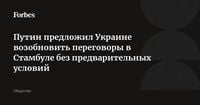In a surprising turn of events, Russian President Vladimir Putin has extended an olive branch to Ukraine, proposing to resume negotiations without preconditions. This offer comes in the wake of escalating tensions and ongoing conflict, as Putin highlighted Ukraine's failure to adhere to a recently suggested three-day truce during a press conference on May 11, 2025.
Putin's remarks came after discussions with leaders from various nations who were in Moscow to commemorate Victory Day. He stated, "We have offered steps to cease fire, and we have never refused negotiations with the Ukrainian side. We offer the Ukrainian authorities to resume direct negotiations, without any preconditions. <...> It is not excluded that it will be possible to agree on new parameters. Now there is a war going on, and we are offering negotiations, what is so bad about that?" This assertion underscores his willingness to engage diplomatically despite the ongoing hostilities.
However, Putin's offer is juxtaposed against claims that Ukraine has violated the ceasefire agreement by conducting strikes on energy facilities, reportedly 130 times. He expressed frustration at what he perceives as a lack of commitment from Kyiv to engage in peace talks.
As the situation unfolds, Putin is set to hold discussions with Turkish President Recep Erdogan later on the same day to outline the conditions for bilateral negotiations, which could potentially take place in Istanbul. There, he hopes to rekindle dialogue that was halted in 2022.
Meanwhile, Ukraine, alongside the United States and the European Union, is preparing to present a list of 22 conditions for a ceasefire to Putin. This document, as reported by NBC News, includes a proposal for a 30-day cessation of hostilities. According to sources, one of the key stipulations is that the U.S. should refrain from supporting Ukraine's NATO membership, a demand previously articulated by Putin himself.
One official noted, "If Putin wants to find a way out, here is a way out," indicating that the proposals aim to create a pathway for peace while addressing Russian concerns. The U.S. envoy, Steve Witkoff, is tasked with delivering these conditions to the Kremlin, although there are concerns regarding his negotiation style, particularly his decision to rely on Kremlin translators during meetings, which has raised eyebrows within the Trump administration.
On May 10, 2025, high-profile leaders including French President Emmanuel Macron, British Prime Minister Keir Starmer, German Chancellor Friedrich Merz, and Polish Prime Minister Donald Tusk convened in Kyiv to discuss the ceasefire proposal. Following their discussions, they reached out to Trump to communicate their unified stance that Ukraine and its allies are prepared for a 30-day ceasefire starting May 12, 2025, without any preconditions.
Macron emphasized that the U.S. would take a leading role in monitoring the compliance of the ceasefire agreement. He warned that should Moscow fail to adhere to the terms, the U.S. and Europe would respond with increased sanctions.
In a related development, Peskov reiterated Russia's position on the ceasefire, stating that Moscow would only agree to a 30-day truce if the U.S. and EU ceased their arms supplies to Ukraine. He articulated concerns that a prolonged ceasefire might allow Ukraine to regroup and strengthen its military position, which he described as giving Ukraine an unfair advantage.
Despite these tensions, Ukrainian President Volodymyr Zelensky has not dismissed the idea of a truce. He stated, "We are not rejecting this offer. It may give diplomacy a chance," reflecting a cautious optimism amidst the ongoing conflict.
Trump has been vocal in advocating for a ceasefire, emphasizing the humanitarian toll of the conflict. He remarked, "Thousands of young soldiers are dying every week, and everyone should want this to stop. I want this, and the U.S. wants this too." He views the ceasefire as a critical first step toward a lasting peace agreement and has expressed readiness to personally engage in the peace process at any time.
As these diplomatic efforts unfold, the world watches closely, hoping for a resolution to one of Europe’s most significant conflicts since World War II. The interplay between military strategy and diplomatic overtures will be crucial in determining the future of Ukraine and its relationship with Russia.
With both sides expressing a willingness to negotiate, albeit under different terms, the coming days will be pivotal. The proposed meetings in Istanbul and the upcoming discussions between the U.S. envoy and Russian officials could set the stage for a new chapter in the ongoing conflict, potentially leading to a much-needed cessation of hostilities.
As the situation develops, the international community remains engaged, advocating for a peaceful resolution that respects the sovereignty of Ukraine while addressing the security concerns of Russia. The complexities of these negotiations highlight the delicate balance required to achieve lasting peace in the region.


